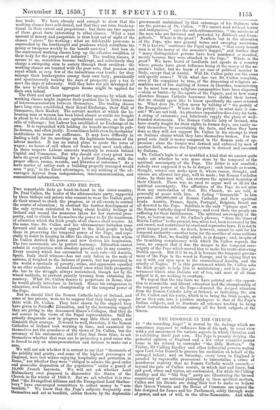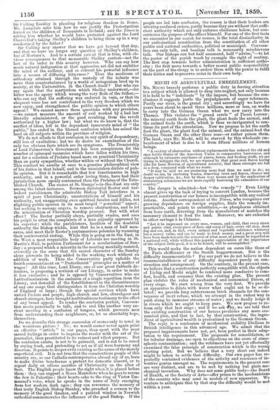THE DISORDER IN THE CHURCH.
IF " the recording Angel" is moved by the feelings which are sometimes supposed to influence him at his task, he must view with a sad amusement the various aspects in which Christian zeal is exhibiting itself just now. The Pope is proudly defying the powerful opinion of England and a few other countries nearer home in his refusal to surrender " the little Mortara." On Friday, Sir Calling Eardley and other influential persons waited upon Lord John Russell to procure his mediation on behalf of the outraged infant ; and on Saturday, every town in England is paraded by ragamuffin processions to immortalize a crime of murderous zealotry that no Roman Catholic would commit,— beyond the pale of Cullen morals, in which fact and fancy, bad and good, crime and virtue, are confounded. For while Sir Culling Eardley and the " Old Guy " party are illustrating the blessed consistency of our national philosophy in these spiritual matters, Cullen and his friends are doing: their best to make us believe that Queen Victoria and the House of Commons are spared the fate designed for James and his Parliament, solely through want of power, and not of will, in the ultra-Romanists. And while Sir Culling Eardley is pleading for religious freedom in Rome, Mr. Langdale asks him how he canjustify the Protestantism forced on the children of Romanists in Ireland; and the Times is asking him whether he would have protested against the Lord Chancellor's taking Shelley's children to bring them up in a way condemned by the father ? Sir Culling may answer that we have got beyond that day, and that we have no longer any question of Shelley's children, but of Mortara's. And to a certain extent that is true, with ob- vious consequences to that memorable Shelley contest—not the last of its order in this country however. Who can say how much natural indignation at that oppressive act did not embitter the mind of the sufferer, and so convert his powerful influence into a means of diffusing bitterness ? Thus the modicum of orthodoxy attained through the custody of the infants was more than counterbalanced by a world of antagonism bred up in society, at the Universities, in the Church itself ? But who can say again that the martyrdom which Shelley underwent,—for bitter was the agony which wrung the very flesh of the father,— who can say that his suffering was endured in vain, or that its eloquent voice has not contributed to the very freedom which we now enjoy, and strengthened the public opinion to which others appeal ? We cannot answer those questions with any precision, —we cannot measure the amount of evil worked by a bad law literally administered, or the good resulting from the revolt authorized by a higher law ; but what we do know is, that the conflict of ideas, left in the dependent inaccurate mind of " the public," has ended in the blessed confusion which has seized the land on all subjects within the province of religion. We do not allude to that confusion in any spirit of despondency, still less of exultation ; but we do desire an examination of the only too obvious facts which are its symptoms. The Premiership of Lord Palmerston's Government has been conspicuous for the number of episcopal vacancies which have fallen within his time, and for a selection of Prelates based more on practical Christianity than on party sympathies, whether within or without the Church. This conduct we ascribe at once to a genuine philosophical view of his duties in that behalf, and to the unmistaken dictate of pub- lic opinion. But it is remarkable that few functionaries in high authority, and in a powerful order loving State, have had their jurisdiction more openly contemned than the Prelates of the Esta- blished Church. The scenes at St. George's-in-the-East are only among the latest instances. Between dictatorial Rector and tur- bulent parishioners the admirable Bishop Tait interferes in a spirit of pure Christianity, unostentatious of himself and his authority, not exaggerating even spiritual fancies and follies, not slighting public opinion in its most turgid " porochial" aspect ; but seeking to assuage angers, to remove obstructions, and to let the ministration of Christian worship proceed. But with what effect ? The Rector partially obeys, partially evades, and uses his pulpit to utter the complaints of a man unjustly oppressed by his superior ; while the parishioners, heedless of the doubtful authority the Bishop wields, hint that he is a man of half mea- sures, and meet their Rector's contumacious polemics by resuming their controversial rioting. While this is going on in the East, in the West a most respectable body of Liberals are meeting in St. Martin's Hall, to petition Parliament for a secularization of Sun- day ; a proposal which a minority in the meeting manfully resisted, avowedly on the score that the sacred character of the Sunday alone prevents its being added to the working week without an addition of work. Thus the Conservative party upholds the fourth commandment on " Protectionist" principles as a matter of wages ! All this time, Lord Ebury, one of our great Sabbath de- fenders, is proposing a revision of our Liturgy, in order to make it less exclusive ; and he is opposed by Conservatives who see Latitudinarianism in the omission of a single repetition from the Litany, and downfall of the Establishment in the discontinuance of any one usage that distinguishes it from the Christian worship of England at large; though the special services which have united Prelate and people, high church and low, churchgoer and church stranger, have brought multitudinous testimony to the effect of any broad appeal. To render the confusion perfect, Convoca- tion meets punctually to talk, and to end like another very an- cient meeting in a confusion of tongues, which prevents men from understanding their neighbours, or, let us charitably hope, themselves.
Do we describe this strange succession of scenes only to revel in the 'wondrous picture ? No ; we would sooner never again print an effective " article " in our pages, than sport with the most sacred feelings in order to impress the reader with the art of the journalist, then prostituted to its vainest and vilest purpose. But the confusion exists, is not to be gainsaid, and is not to be cured by crying hush, and pretending to act as if all were harmony and decorum. It points to deeper evils existing as the cause of the merely superficial evil. It is not true that the conscientious people of this country are, as our Catholic contemporaries abroad say of us, born to make divine beneficence a pretext for domestic discord, or to repeat daily, an odious sacrifice of Christianity on the altar of Sect. The English people know the right when it is placed before them : they can support a Moses Monteflore when he goes to rescue the Jew in Palestine; their hearts echo to the ring of Victor Em- manuel's voice, when he speaks in the name of Italy emerging from her modern dark ages ; they can reverence the memory of that truly English Bishop Stanley, who preached a sermon to the memory of the good Quaker, and a painted window in Norwich cathedral commemorates the influence of the good Bishop. If the people are led into confusion, the reason is that their leaders are uttering confused orders, partly because they are without that puffi- cient authority which not only enforces obedience below, but con- centrates the purpose of the officer himself. For one of the first facts we encounter in our search for causes, is the total dissimilarity in our ecclesiastical constitution from the constitution of all other public and national authorities, political or municipal. Convoca- tion can only talk, and bootless talk is necessarily mischievous talk. Our bishops can but half command, half "advise,"—to let the pastor of the parish teach by example the right of mutiny. The first step towards better administration is sufficient autho- rity ; the first move towards a better moral public responsibility on the part of the clergy is to endow them with the power to f their duties and to preserve order in their own body.



































 Previous page
Previous page